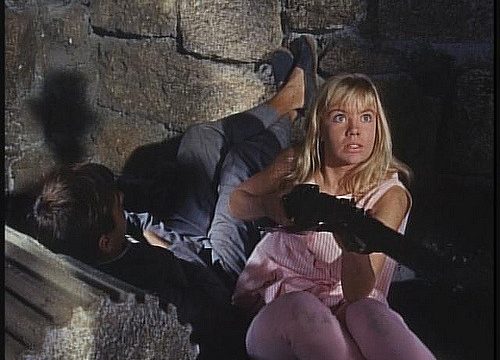For once, I have read the book on which this is based. Years after my sisters and I fell in love with this on the Disney Channel, I found the book at the Altadena Public Library’s annual book sale, during the buck-a-bag time. (My mother used to fill several bags with romance novels to be doled out over the course of the year, and my sisters and I each got a bag of our own.) I’m pretty sure this is the same way I acquired the book of The North Avenue Irregulars, but the book of The Moon-Spinners is actually good, though the two have very little in common.
In the movie, Nikki Ferris (Hayley Mills, who despite the other spellings I’ve seen writes it “Nikki” the one time the name is written out in the movie) is on vacation in Crete with her Aunt Frances (Joan Greenwood), a musicologist looking for material for the BBC. They are to stay in a small town called Agios Georgios at an inn called The Moon-Spinners, but when they get there, owner Sophia (Irene Papas) does not want to rent to them. She claims it’s because they are busy hosting a cousin’s wedding, but it is really her brother, Stratos (Eli Wallach), who does not wish to have them stay. He lived in London and feels shady. But Sophia’s son, Alexis (Michael Davis), persuades his mother.
Also staying at the inn is an “old Englishman,” as described by Alexis, who turns out to be Young and Attractive Mark Camford (Peter McEnery). For whom Nikki immediately falls. He and Stratos are watching each other, it turns out because Mark believes Stratos to be guilty of a jewel robbery for which Mark took the blame, back in England. Stratos becomes even more suspicious at how quickly Mark and Nikki hit it off, believing it’s all part of some plan to bring him to justice. Which it isn’t; it’s just hormones.
Probably the most famous scene in the movie, inasmuch as any part of this movie is famous, is the rescue of Nikki from the windmill. She has been tied up in the upper floor, and of course the door is locked. But Alexis and the village boys have long—probably village boys have been doing this as long as there have been windmills in Agios Georgios—made a game of riding the windmill’s blades around, and he climbs into the window. All well and good. But Nikki is not a teenage boy from rural Crete, and it’s considerably harder for her to make her escape. Most of the audience has never been a teenage boy from rural Crete, causing us to sympathize with her fear. The scene is shot day-for-night, but it’s still plenty suspenseful.
Similarly, probably the most tragic character in the movie is one you’re really not supposed to find sympathetic. Cynthia Gamble (Sheila Hancock) is a wealthy, upper class woman trapped in a small Cretan village. She has no friends. Her only family is her disdainful husband. She’s tired of history. She’s a trained nurse, but what is she going to do with that? (I mean, she’s also kind of racist, so “improve the locals’ lives” is admittedly not a possibility.) So she drinks and hopes that the random young Englishwoman who appears in her house has friends or family that she knows so she can talk about something she cares about.
I wonder how much of the film’s disappointing performance at the box office has to do with the Shirley Temple Phenomenon. You see, Hayley Mills was no longer Pollyanna, swanning about Harrington being glad. She was eighteen. She wanted to be romantic and alluring. There was definitely a whiff of sex in her relationship here. And, you know, she holds an English consul (John Le Mesurier) at gunpoint, albeit briefly and before he identifies himself. Shirley Temple’s teenage movies did poorly in no small part because audiences didn’t want to see her grow up, and I’m wondering if that might not have been the case with Hayley Mills as well.
As for me, well, Hayley Mills is about my mom’s age. I won’t say this is the first of the movies that I saw her in, but this and Pollyanna—and The Parent Trap—were on pretty steady rotation on the Disney Channel, so this was just part of how I saw her. And the movie’s a lot of fun, honestly, a light little thriller with a completely ludicrous climax for which Walt personally lured Pola Negri out of retirement. It’s not a challenging movie on any level, but it certainly deserves to be remembered more than it has been.
And once again, it’s got a heck of a cast. Even if Hayley Mills isn’t your speed, Eli Wallach, Pola Negri, and Irene Papas are there. Not to mention the fine array of character actors. This has been consistent in even the bad movies I’ve done for this column; Disney put a lot of effort into decent casts, even going out of their way to cast older stars who hadn’t had much of a career; this is actually Pola Negri’s last film, and Walt personally lured her out of retirement for it.
In the book, Nikki is older and independent, a minor functionary for the British embassy in Athens taking an Easter vacation on Crete; she travels to Agios Georgios a day ahead of her aunt and meets the already wounded Mark whose younger brother Colin has been captured and who has the able assistance of a Greek sailor. We also miss out on the Obviously Gay British Sidekick for Stratos, and we actually encounter Sophia’s husband, an abusive man who meets a well-deserved end. Honestly, a more accurate adaptation of the book could be interesting to watch. I’ll still always have a soft spot for this.

